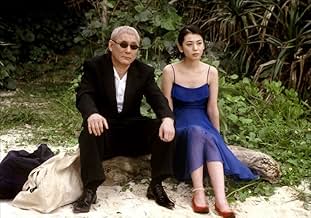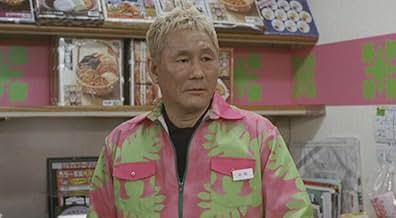ÉVALUATION IMDb
6,3/10
4,1 k
MA NOTE
Ajouter une intrigue dans votre langueBeat Takeshi, a prominent actor, meets a lookalike named Kitano, who is a struggling actor, but after the meeting, Kitano's dreams take a violent, surreal turn.Beat Takeshi, a prominent actor, meets a lookalike named Kitano, who is a struggling actor, but after the meeting, Kitano's dreams take a violent, surreal turn.Beat Takeshi, a prominent actor, meets a lookalike named Kitano, who is a struggling actor, but after the meeting, Kitano's dreams take a violent, surreal turn.
- Prix
- 1 nomination au total
Photos
Takeshi Kitano
- Beat Takeshi
- (as Beat Takeshi)
- …
Kotomi Kyôno
- Takeshi's Girl Friend
- (as Kotomi Kyono)
- …
Histoire
Le saviez-vous
- AnecdotesThe audience at the 2006 Venice Film Festival was very confused and frustrated about the film. But Kitano had warned the audience ahead, asking them not to attempt to analyze the film, but instead, just to let go and feel the film, and in the press conference afterwards, Kitano said that he wanted audiences to come out of this film not knowing what to say or what to think.
- Citations
Beat Takeshi: That guy... the one who looks like me. What could his life be like?
- ConnexionsFeatured in H-X3C (2008)
Commentaire en vedette
Two years after dusting down Shintaro Katsu's blind Zatoichi persona for his quirky period-drama re-jig, Takeshi Kitano is back in his own original territory - with a somewhat intriguing inclination towards double-vision.
Takeshis', which debuted at this year's Venice International Film Festival and subsequently screened at the celluloid festas in Vancouver, Toronto and London, has thus far traversed a bumpy course, with critical maulings riding shotgun up there alongside the more expected superlatives.
On one level a homage to the yakuza gangster flicks Kitano helped to define (since taken to the violent extreme by Takeshi Miike in Ichi The Killer), this movie also doubles as a parody of the style and might just be Kitano's farewell kiss to same. The 58-year-old writer/director has quipped that this is a funeral for the genres he explored over the last dozen movies, in particular the gangster premise, and die he apparently does - several times over - as do more than half the cast and extras in a series of grandiose shoot-outs. The yakuza die. The samurai and the sumo die. Heck, even the deejay in the club scene dies.
In the process Takeshis' throws together a smattering of melancholia, a whacked- out sense of humor, tap-dancing musical interludes, a Bonnie & Clyde twist, and touts more guns than a John Woo slug-fest. The narrative structure is as peppered as a spray of bullets from an Uzi.
The gist of the story is a shake-down of two characters played by 'Beat' Takeshi (Kitano) himself: one the "real life" movie star/director, and the other a shy, deadbeat convenience store clerk who aspires to an actor. But there's a third overwhelming id here, and that's Kitano's own on-screen alter ego from those earlier yakuza romps. The question - which one of these three is the real McCoy? - disintegrates as proceedings reach out on a surreal, metaphysical limb in which dreams interplay with reality, nightmares become farce - and then all swings violently back into an unsure version of the here and now. This makes for a sublime visual feast that's as baffling as it is refreshing.
Kitano's trilogy of parts aside, there's a bevy of other doppelgangers, mirror images and dead-ringers rife throughout this movie. Kotomi Kyono, while a tad dull as the movie star Takeshi's girlfriend, bears more than just costume jewelery sparkle in her ulterior role as a glitzy, ditsy yakuza girlfriend who happens to be the deadbeat Takeshi's tormenting neighbor.
As the creative synod here, Kitano certainly isn't afraid to poke fun at himself or the genres he's looked at more seriously in the past. But, after teasing with some mischievous insights, he then skirts the issue. And the weak moments in Kitano's earlier film Dolls (2002) - self-conscious "artistic" references - are stitched into Takeshis' with abandon. A recurring clown motif, bullets-as-star- constellations riff, and heavy-handed symbolism (in this case of a caterpillar) almost bludgeon the viewer, as if Monty Python had taken a blunt instrument to David Lynch - rendering it all a bit like Eraserhead on a bad hair day.
Not that this is such a bad thing; at times, it's brilliant. In some bizarre way - don't bother asking how - Kitano pulls off the slap-stick Mothra-sized larva pantomime that appears at various stages throughout proceedings.
But on the whole it's these asides that make the movie lurch, and off-shoots like the World War II scenes that book-end the film come off as just plain obscure. Takeshis' could have been that much stronger a movie. As it stands, in spite of (or because of) the pointed vignettes, the tap-dancing, and the associated meanderings-within-daydreams, it's a minor masterpiece. Just.
ANDREZ BERGEN
Takeshis', which debuted at this year's Venice International Film Festival and subsequently screened at the celluloid festas in Vancouver, Toronto and London, has thus far traversed a bumpy course, with critical maulings riding shotgun up there alongside the more expected superlatives.
On one level a homage to the yakuza gangster flicks Kitano helped to define (since taken to the violent extreme by Takeshi Miike in Ichi The Killer), this movie also doubles as a parody of the style and might just be Kitano's farewell kiss to same. The 58-year-old writer/director has quipped that this is a funeral for the genres he explored over the last dozen movies, in particular the gangster premise, and die he apparently does - several times over - as do more than half the cast and extras in a series of grandiose shoot-outs. The yakuza die. The samurai and the sumo die. Heck, even the deejay in the club scene dies.
In the process Takeshis' throws together a smattering of melancholia, a whacked- out sense of humor, tap-dancing musical interludes, a Bonnie & Clyde twist, and touts more guns than a John Woo slug-fest. The narrative structure is as peppered as a spray of bullets from an Uzi.
The gist of the story is a shake-down of two characters played by 'Beat' Takeshi (Kitano) himself: one the "real life" movie star/director, and the other a shy, deadbeat convenience store clerk who aspires to an actor. But there's a third overwhelming id here, and that's Kitano's own on-screen alter ego from those earlier yakuza romps. The question - which one of these three is the real McCoy? - disintegrates as proceedings reach out on a surreal, metaphysical limb in which dreams interplay with reality, nightmares become farce - and then all swings violently back into an unsure version of the here and now. This makes for a sublime visual feast that's as baffling as it is refreshing.
Kitano's trilogy of parts aside, there's a bevy of other doppelgangers, mirror images and dead-ringers rife throughout this movie. Kotomi Kyono, while a tad dull as the movie star Takeshi's girlfriend, bears more than just costume jewelery sparkle in her ulterior role as a glitzy, ditsy yakuza girlfriend who happens to be the deadbeat Takeshi's tormenting neighbor.
As the creative synod here, Kitano certainly isn't afraid to poke fun at himself or the genres he's looked at more seriously in the past. But, after teasing with some mischievous insights, he then skirts the issue. And the weak moments in Kitano's earlier film Dolls (2002) - self-conscious "artistic" references - are stitched into Takeshis' with abandon. A recurring clown motif, bullets-as-star- constellations riff, and heavy-handed symbolism (in this case of a caterpillar) almost bludgeon the viewer, as if Monty Python had taken a blunt instrument to David Lynch - rendering it all a bit like Eraserhead on a bad hair day.
Not that this is such a bad thing; at times, it's brilliant. In some bizarre way - don't bother asking how - Kitano pulls off the slap-stick Mothra-sized larva pantomime that appears at various stages throughout proceedings.
But on the whole it's these asides that make the movie lurch, and off-shoots like the World War II scenes that book-end the film come off as just plain obscure. Takeshis' could have been that much stronger a movie. As it stands, in spite of (or because of) the pointed vignettes, the tap-dancing, and the associated meanderings-within-daydreams, it's a minor masterpiece. Just.
ANDREZ BERGEN
- andrez_iffy
- 11 févr. 2006
- Lien permanent
Meilleurs choix
Connectez-vous pour évaluer et surveiller les recommandations personnalisées
- How long is Takeshis'?Propulsé par Alexa
Détails
- Date de sortie
- Pays d’origine
- Sites officiels
- Langue
- Aussi connu sous le nom de
- Такешіз
- Lieux de tournage
- sociétés de production
- Consultez plus de crédits d'entreprise sur IMDbPro
Box-office
- Brut – à l'échelle mondiale
- 1 270 717 $ US
- Durée1 heure 48 minutes
- Couleur
- Mixage
- Rapport de forme
- 1.85 : 1
Contribuer à cette page
Suggérer une modification ou ajouter du contenu manquant

Lacune principale
By what name was Takeshis' (2005) officially released in Canada in English?
Répondre




















